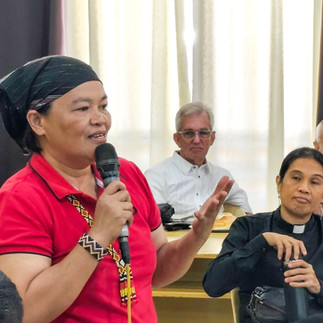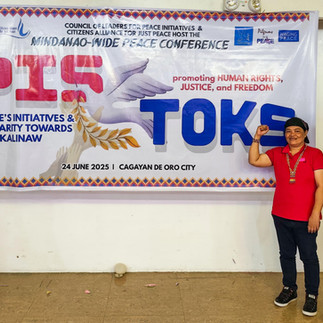Former IP political prisoner, peace advocates reaffirm long-standing support for genuine peace talks; call to uphold IP rights
- Katribu Nasyunal
- Jun 27, 2025
- 5 min read
By Katribu Kalipunan ng Katutubong Mamamayan ng Pilipinas
June 27, 2025
Cagayan de Oro City, Philippines — During the Mindanao-wide Peace Conference on June 24, 2025, Manobo leader and former political prisoner Julieta Gomez stood before a gathering of peace advocates, Indigenous Peoples, youth, and faith-based organizations—not simply to recount her personal story, but to reaffirm the Indigenous Peoples’ support for a peace process that addresses the roots of injustice and armed conflict in the country.
Gomez, a member of Kahugpungan sa mga Lumadnong Organisasyon sa Caraga and a council member of Katribu Kalipunan ng Katutubong Mamamayan ng Pilipinas, emphasized that the Government of the Republic of the Philippines (GRP) - National Democratice Front of the Philippines (NDFP) peace negotiations must be grounded in substance and justice. “Malinaw ang aming suporta sa panawagang ituloy ang tunay na usapang pangkapayapaan. Ngunit hindi ito dapat maging pakitang-tao lamang na hindi tinatalakay ang mga tunay na ugat ng tunggalian,” she said.
(“Our support for the call to continue genuine peace talks is clear. But this must not be a mere token gesture that fails to address the roots of the conflict.")
Her presence held weight. Arrested in 2021 and imprisoned for nearly four years on trumped-up charges dismissed by courts, Gomez underscored how the state’s counterinsurgency efforts have targeted Indigenous communities. “Walang tunay na kapayapaan hanggat may mga biktima ng paglabag sa karapatang pantao,” she said, citing the destruction of over 200 Lumad schools, forcible displacement, militarization, and the weaponization of the law to criminalize dissent. “Hindi lamang edukasyon ang nilalansag—pati mismong kultura, kabuhayan, at buhay ng mga Katutubo,” she added.
(“There can be no genuine peace as long as there are victims of human rights violations.” It's not just education that is being dismantled—but the very culture, livelihood, and lives of Indigenous Peoples.”)
Revisiting the Oslo Joint Statement
The conference revisited the November 23, 2023 Joint Statement signed in Oslo, Norway, where representatives of the GRP and NDFP committed to forging a peace negotiation framework that acknowledges “deep-rooted socioeconomic and political grievances.”
The statement was facilitated by the Royal Norwegian Government and welcomed by peace advocates as a significant opportunity to resume formal talks after their unilateral termination in 2017 under the Duterte regime.
However, that momentum has since faltered. The Marcos Jr. administration has remained silent on the Oslo agreement. Instead, it has doubled down on counterinsurgency strategies under the National Task Force to End Local Communist Armed Conflict (NTF-ELCAC). Presidential adviser Carlito Galvez Jr. claimed in late 2024 that the president was “very committed” to seeing peace agreements through—but on the ground, civil society and human rights groups say otherwise.
The juxtaposition of state efforts to resume negotiations on paper while continuing red-tagging, military operations, and other violations in practice has led many to question the sincerity of the peace initiative. Illegal arrests, including the case of NDFP consultant and Indigenous leader Simon Naogsan, continuing detention—like that of NDFP consultant Loida Magpatoc, and reports of enforced disappearances—such as that of James Jazmines, brother of an NDFP peace consultant—have amplified fears that the space for democratic engagement is rapidly shrinking.
These actions violate the Joint Agreement on Safety and Immunity Guarantees, which both parties have reaffirmed as a cornerstone of the peace process.
Listening from Mindanao’s Frontlines
The Council of Leaders for Peace Initiatives (CLPI), which organized the conference, emphasized Mindanao’s unique position in the peace process. With its complex history of armed conflict, ancestral domain struggles, and the ongoing transition under the Bangsamoro Autonomous Region in Muslim Mindanao, the island offers both lessons and urgency for genuine peace talks.
CLPI emphasized that the Lumad, Moro, and Christian communities in the region have long engaged in people-to-people dialogue, navigating identity and resistance through shared aspirations for peace based on justice.
CLPI also noted that in the aftermath of Martial Law in Mindanao and pandemic lockdowns, rural communities experienced intensified militarization and surveillance. Participants at the conference spoke of forced or faked surrenders and threats against families who refuse to cooperate with the military, raising serious questions about the integrity of the government’s “whole-of-nation” approach to counterinsurgency.
Against this backdrop, CLPI renewed its call for the GRP and NDFP to resume peace talks. It urged both parties to recognize the validity of previous agreements, identify panel representatives, clarify the main agenda items, and release a clear schedule for negotiations.
CLPI emphasized that the peace process should not be premised on surrender or defeat, but on addressing the structural issues that fuel unrest, including landlessness, exploitation, and historical marginalization of the Indigenous Peoples.
Strengthening the Movement for Peace
The Mindanao conference was the third in a series of regional “listening summits” following similar gatherings in Luzon and Visayas. The CLPI underscored that a strong, informed, and persistent peace constituency is essential to sustaining momentum and pushing the GRP and NDFP to stay the course.
Participants reiterated their support for the Comprehensive Agreement on Social and Economic Reforms (CASER), developed through grassroots consultations, including among Lumad and Moro communities. During the breakout session, Gomez made clear that ancestral land rights, access to education, demilitarization of communities, and genuine self-determination are non-negotiable components of any lasting solution to the armed conflict.
Uphold Peace Based on Justice
In the final moments of the gathering, Gomez offered what many described as both a testimony and a challenge to all: “Ako si Julieta Gomez. Isa akong Lumad. Isa akong aktibista. Isa akong bilanggong politikal noon na pinalaya ng pagkakaisa at kolektibong pagkilos ng sambayanan... mula noon hanggang ngayon, ako, kasama ang malawak na hanay ng mga Katutubo at Moro, ay naninindigan para sa kapayapaang nakabatay sa hustisya.”
(“I am Julieta Gomez. I am a Lumad. I am an activist. I was once a political prisoner, freed through the unity and collective action of the people... from then until now, I—together with the broad ranks of the Indigenous Peoples and Moro—stand firm for peace founded on justice.”)
Katribu Kalipunan ng Katutubong Mamamayan ng Pilipinas reiterates the following:
Resume the GRP-NDFP peace talks based on prior agreements and a principled framework;
Uphold Indigenous Peoples’ rights to ancestral lands and self-determination;
Immediately stop militarization, red-tagging, terrorist designation, and criminalization of the Indigenous Peoples;
Dismantle the NTF-ELCAC and junk the Anti-Terrorism Law;
Advance CASER to address the roots of the armed conflict.
The path towards just and lasting peace must be rooted in the lived realities of oppressed communities—the Indigenous Peoples, Moro, peasants, and workers—whose struggles embody the true costs of a society built on exploitation. The Mindanao-wide Peace Conference was not merely a call to listen—it was a call to act, to dismantle the conditions of war, and to uphold the people’s right to shape a future free from repression, displacement, and deceit.
Peace will not be handed down by those in power. It will be claimed by the collective will of those who resist.
From the highlands of Mindanao to the ancestral lands of the Indigenous Peoples across the country, and toward negotiating tables yet to be named, the Indigenous Peoples, Moro, and all peace advocates, will remain steadfast in the struggle for peace based on justice and call for accountability. #
















Comments